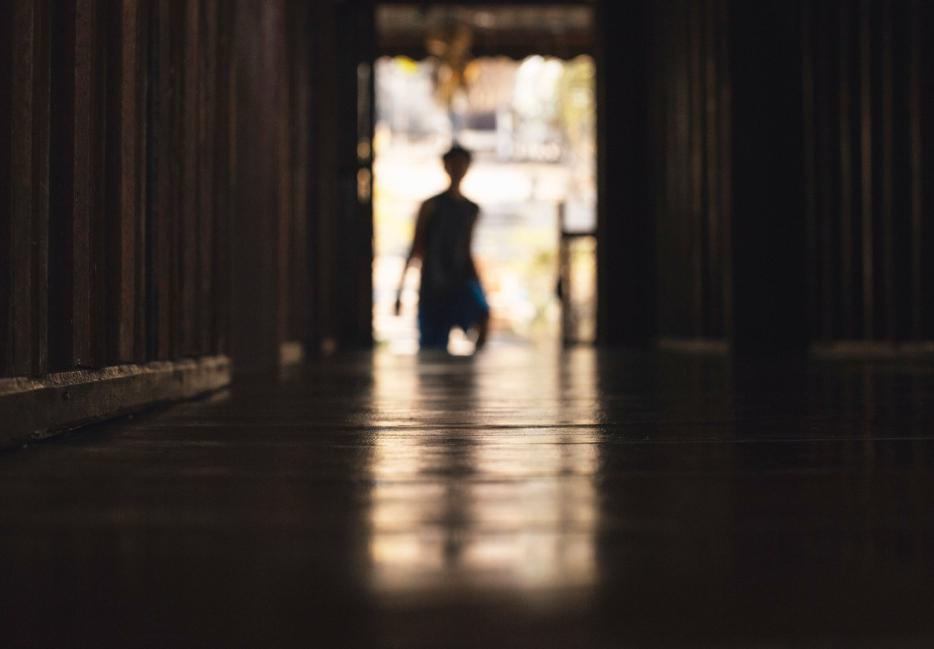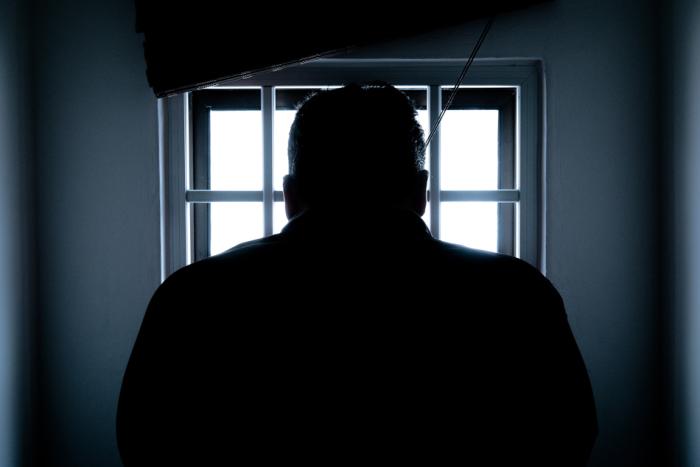The first time I lost my mother, I was six years old. It was the end of spring, in 1996, and I was perched on the armrest of my family’s grey loveseat, watching her sit, legs crossed, in the moss-green recliner. Agitated, she stared past me as smoke ascended from her half-finished cigarette. A Children’s Miracle Network telethon played quietly in the background and she asked me to turn it off because she thought the people on TV could see her. Confused, I tried my best to reason with her, which only made her more uncomfortable. So, I hurriedly grabbed the remote and switched off the TV.
This is when I first understood what it means for someone to disappear. I hadn’t physically misplaced my mother, like those times I hid behind the clothing racks in Wal-Mart and emerged only a few minutes later unable to find her, my heart thumping so loudly it felt like it was in my ears, but her dissociation from reality made it so that it was no longer my mother in front of my eyes. I’d lost her bubbly personality, her benevolent soul, and her maternal connection to me. In no simpler terms, it was as though she had died.
She was forty. She’d slipped into what’s colloquially referred to as a “nervous breakdown,” which, over time, I came to understand, had been triggered by a prolonged period of stress. This was how I was introduced to the concept of stress: in fragments and overheard exchanges, repeated enough that I absorbed it as the “reason why.”
In clinical terms, my mother suffered a major depressive disorder with obsessive-compulsive traits. She believed her mind was wide open for everyone to read, and inside was a barrage of voices that increasingly pulled her away from reality. She’d bolt out of bed at ungodly hours only to go sit in the green recliner where, trapped in her own mind, she’d stare off into the distance trying to decipher the real from the imagined. If I were around, I’d stare back, trying to figure out what exactly had stolen her mind and inhabited her body.
To my then-nine-year-old sister and I, the symptoms seemed sudden, but for weeks before she was hospitalized, my father had witnessed my mother’s condition deteriorate. Leaving for work every night at 6 and returning the following morning by 7, he was only home during the day. Late one night, I awoke to my mother’s silhouette at my door. “What?” she asked. My eyes began adjusting to the darkness, and I curled my legs in toward my chest, half-sitting up. “Lisa, what?” she asked again. But I didn’t have an answer for her. Had I called out for her in my sleep? I still don’t know. And ultimately, it doesn’t matter. The point is, when I saw my mother at my door that night, instead of feeling comforted by her presence, I felt afraid.
Early on in my life, I came to believe that my mother’s mind is forever fragile. And because stress was the only explanation I had for this fragility, stress became the enemy—the thief that had stolen my mother and replaced her with someone I didn’t recognize. But besides “stress,” no one in my family can recall how my mother’s breakdown was explained to my sister or me. Isn’t that strange? There was no check-in with our family doctor, no sit-down with a counselor, therapist or social worker—not even a formal conversation with my father about what, exactly, was happening to her. Now, nearly two decades later, I’m trying to figure out why.
I soon noticed that the voices always got priority. And as mom grew distracted by them, I had to find ways to get—and keep—her attention. I’d start talking and she’d hold up her finger, indicating I had to wait my turn. “Mom!” I’d chirp, snapping my fingers in front of her face or grabbing her cheeks and directing her gaze back at me. But as these attempts failed, I had to get more creative. Because she feared that people could hear her thoughts, I devised a mind-reading game for us to play. I’d think something, like I love my bunny, and ask her to guess my thought. She’d of course guess wrong, and then it would be her turn to think something and my turn to guess.
“See, Mom,” I told her. “I really don’t know what you’re thinking! You believe me, right?”
“Okay,” she might say. “I see that.” And I’d beam with pride.
Psychologists would call my game a form of magical thinking—the belief that doing X somehow relates to Y. Ever since I can remember, I’ve been a magical thinker. It’s called worrying. And I do it to prevent the worst from happening, or at least prepare me for when it inevitably will. I’ve sought therapy in recent years for this, yet somehow glossed over the role my mother’s breakdown played in this facet of my personality. My mind-reading game was a creative, perhaps even sophisticated, gesture for a six-year-old, but it was as useful a solution as having mommy kiss your “boo-boo” and expecting the pain to disappear. I wanted to control a chaotic situation and prevent the person I was closest to from feeling any pain. But as much as I willed the opposite from happening, my mother kept hurting.
Nearly two months after her symptoms first appeared, my father reached a breaking point. He knew my mother needed help beyond the reasoning he was forced to do with her on a daily basis. One afternoon, he went to see our family doctor and inform her of what was going on. The doctor didn’t act on my father’s concerns right away. And while there may be several good reasons for this, like not wanting to breach patient-doctor confidentiality, my father left that appointment feeling hopeless.
Some days later, he went back, this time accompanied by his older sister, who he’d hoped could corroborate his concerns. The doctor agreed to at least talk to my mother. They spoke on a Friday in July, the day before we were supposed to go on our first family camping trip. The doctor concluded that a hospital stay was in my mother’s best interest. My mother pleaded with the doctor to let her come camping with us for the weekend and, come Monday, she promised she’d check herself into the hospital. Doctor’s orders trumped camping.
That night, I sat beside my mother on the edge of her bed, my feet dangling over her half-packed suitcase. No bug spray or sunscreen inside; just several outfits and toiletries that indicated an indefinite stay. The next morning, my father would drive her to a facility an hour away, where, for several weeks, she’d make a new home—away from me.
My memories of that drive are vague, but I’m told that more than once, my mother suggested turning back. We eventually reached the laneway of my grandparents’ house, where my sister and I left the vehicle and went inside. Until then, I don’t think we fully understood that taking Mom to the hospital meant she wouldn’t be coming camping with us. It meant she wouldn’t be coming home with us, either. Devastated, my sister ran back to the driveway. The ends of her stiff arms rolled into fists as she began crying and stomping her feet. My mother watched through the rearview mirror as my father pulled out of the driveway with her in the passenger seat.
In August, my mother came home. It’d been four weeks and she still wasn’t completely herself. We stayed often at my grandparents’ house. Whenever my mother started to feel off, my grandma told her to go lie down. My sister desperately wanted to follow her into the bedroom, but my grandma would shoo her away, insisting that my mom needed rest. This angered my sister greatly. She felt like she was being kept from our mother, as though her very presence would make things worse.
I continued doting on my mom, insisting we play the mind-reading game to keep her on track, scribbling notes from our sessions in my journal. It took a few weeks for the medication to take effect but one afternoon, she had about two hours of lucid thinking and I was absolutely convinced my game had done it. “You’re like my mom again!” I said, as she was milling about our kitchen. “I feel really good right now,” she replied, sounding more like herself than she had in weeks. But later that day, the agitation and the intrusive thoughts returned. Had I failed her? It would be a few more rollercoaster-like days until the chemicals stabilized and the voices disappeared.
One month after she’d returned home, my father’s stress finally caught up to him and he had a heart attack during one of his overnight shifts. Around 5 a.m. we got the phone call from the police. “He’s dead, isn’t he?” my sister asked after my mom hung up. He wasn’t—but by then we’d learned that our parents could disappear without warning.
*
In 1998, a social scientist named Brenda Gladstone was studying how mentally ill adults readjusted as they moved from the hospital back into their communities. During her research, which she was conducting for the Centre for Addiction and Mental Health in Toronto (then known as Queen Street), a psychiatrist and social worker from the centre informed her that adults who presented at the hospital weren’t being asked if they had dependent children. Gladstone was shocked—not just at the failure of front line clinicians to inquire about kids of ill parents, but at her own failure to examine how mental illness might affect a person’s ability to parent once they returned home.
I was eight at the time Gladstone was beginning this research. Nearly two decades later, I had the chance to speak with her about the intersection of her work and my own lived experience. Today, she suspects that not a whole lot has changed when it comes to these situations—that children like me become invisible because too often, healthcare professionals just don’t ask about them.
This isn’t necessarily a malicious omission. In North America, our approach to mental illness treatment is still largely individualized. Doctors are responsible for helping their patients, not for figuring out how their patient’s illness is wearing on the rest of the family, or for working to connect the family to appropriate services. An abundance of information exists for parents of mentally ill children, but when it comes to the reverse, the literature is scarce. The resources that do exist, be it picture books, information sheets or child support groups, are spotty and poorly connected.
Because of this, each family member winds up putting together pieces of the same puzzle. I’ve had to fill in the gaps of my own memories with the memories of my sister, my father and my mother. I only learned the proper definition for my mother’s disorder a year ago when I began researching this story. Her episode might have been a “temporary aberration,” as her psychiatrist described it, but her inability to cope with prolonged stress is something that’s still being managed with medication.
As for me, the research says I should have come out of this whole experience one of two ways: at risk, or resilient. If I’m at risk, then thanks to things like genetics and the stigma surrounding poor mental health, the chance of developing my own tendency toward mental illness is increased. If I’m resilient, then I’ve somehow thrived despite adversity by finding ways to cope. But what exactly does resilience look like in the face of an illness you still don’t quite understand?
I’m fortunate to have had a strong father and compassionate relatives who took great care of me while my mother was sick. Still, the only explanation I had for my mother’s episode was stress. As a child, it was up to me to sort out for myself what this would mean for the future, and what my role would be in making sure it never happened again.
*
A month after my mom returned home, school started. My grades didn’t seem to suffer and I was still socially active. But marks of guilt and fear slowly appeared. My mother shared with me a note I wrote her when I was thirteen, seven years after the breakdown. (I used to write my mother a lot of notes. It was often my way of dramatically apologizing for upsetting her.) It reads:
“I REALLY hope you forgive me. I keep thinking I’m gonna make you have a nervous break down and I think it was my fault last time, cuz I’m worse than Big Sister when it comes to stressing you out. Please forgive me and stay calm, not stressed.”
Seven years later, I was still afraid of losing her. Seven years later, I still felt responsible for her disappearance. And I wasn’t just concerned that she’d slip back into a dissociative state; I worried I might develop her symptoms myself, as though her illness were air-borne and I could catch it just by standing too close. Some time after her breakdown, I came up with a strange thought: what if my mom wasn’t actually my mom at all? What if she were still my relative—say, my aunt—and everyone in my family was working to keep it a secret from me? For over a week, I tortured myself with this paranoid thought, ruminating on it day after day. I wonder now if my flirting with such a bizarre idea was proof that I didn’t trust my mom to truly be the person I believed she was. After all, I’d witnessed her turn into someone else before. In fact, I would again.
The second time I lost my mother, I was fifteen. Nine years older, I felt more equipped this time around to understand her symptoms. She spotted the signs much earlier than the first time, and voluntarily checked herself back into the hospital for a few days. I discovered a note from then, too, that I’d stuffed into her suitcase. “I can’t wait until you come home,” it reads. “Because you’re definitely coming back.”
*
Even today, my mother’s disorder still feels somewhat mysterious. It’s not schizophrenia; it’s not bipolar; and it doesn’t quite fit the widely held understanding of depression. It had a beginning and it had an end, which made it all the more complicated to define. More than having a medical definition, though, what I most needed to understand growing up was why she was no longer behaving like herself. Only in speaking with her for this story did I learn how her psychiatrist explained it to her all those years ago: “Your mind is like an overheated car engine,” he said. “You’ve run it too fast and for too long. It can’t go forward, it can’t go backward. It just needs to rest.” Had that analogy been shared with me when I was six, would I have better understood losing her? Maybe. Would it have left me unaffected? Maybe not.
The sudden transformation of my mother’s character has slowly and quietly transformed me. Assuming it wouldn’t is like thinking a tornado that touches down in a heavily populated area won’t cause any damage. The destruction might be devastating or minimal, but the psyche is still forever altered—not just by the disaster itself, but by the fear it has awakened. Her swift departures from reality left behind a sense of instability that manifests in my relationships today. Despite no substantial threat, I anticipate being blindsided by those I love; one day, they’ll morph into somebody different, someone who will disappear. Because I’ve seen the person I love most vanish before my eyes, it’s not a question of if, but when.
Over time, my mother’s inability to handle stress has, in some ways, become my own. Whenever she encounters stress—her brother slowly dying of an aggressive cancer; her father passing only a month later; her mother succumbing to the flu a year after that—I’m the one who recoils in fear. Will this happen to her again? For years, even mentioning her breakdown prompted a panic that, if talked about too much, it would sense her vulnerability and steal her again.
I know so much more than I did before. At this point, I’ve done the uncomfortable interviews with my family, joined the Facebook groups, done the research and talked to the experts. I belong to a subculture now: children of parents with mental illness.
I was overlooked. Not by one person or professional, but by a system that still struggles to recognize mental illness as a family matter. And I’ve realized that when children are rendered invisible in these circumstances, they start to see themselves and the event itself as invisible, too. Any feelings or concerns they have about it become unrecognizable and unimportant.
I don’t fault my family for, somewhere along the way, choosing protection over examination. They were trying to figure out what was happening just as much as I was. And because my sister and I weren’t acting out in obvious ways, my parents assumed we were fine. But watching a parent detach from reality is a special kind of trauma, and its impact evolves over time. I thought I’d dealt with it. But in asking the tough questions, which, at this point, is really all that’s in my power to do, I see now that the dealing has just begun.
*
We eventually got rid of the green chair, which, for me, was a relief. Its worn seat only reminded me of how lonely it must have been inside my mother’s mind, and how scary it was to watch her disappear. But like my handwritten notes, other objects from that time remain within the walls of my childhood home—things I’d long forgotten had anything to do with the breakdown. Like the pink ceramic bunny I used for years as a bedroom doorstop. My mother painted that while she was in the hospital. Or the stuffed gorilla with red hearts on the paws I gave her during her stay. She recently found it while we were cleaning out my old room and deciding what to purge.
She asked me if she could keep it. It surprised me that she’d want to hold on to it—a reminder of the suffering she quietly endured, and of her time away from home. But maybe not all of these objects are dark reminders of the past. They’ve survived after all these years, delicate as they are, like perfectly preserved artifacts meant to show that fragility does not equal lack of strength. My mother is proof of that. She’s healthy and has been since her relapse. I never thought she, my sister or my father would be comfortable enough to revisit her breakdown. I never thought I would, either.
In Gladstone’s research, she points out a major flaw in the at-risk/resilient discourse: it only leaves room for two possible outcomes. You’re either fucked or you’re fantastic. (My words, not hers.) But what if you’re somewhere in between those two destinations? What if you never reach a destination at all? Like me, your fate might be to keep pulling at the threads, trying to make sense of how things were handled; trying to uncover how your parent’s illness has shaped you, how much you might be predisposed to it, and what, exactly, that means for the road ahead.






